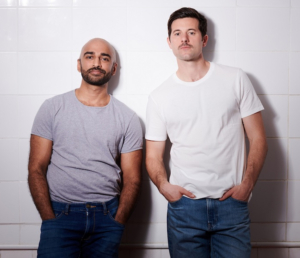Guest Blog: Director Ben Anderson On JERKER at the King's Head Theatre

Tonight, we open the first UK revival of Robert Chesley's play Jerker. Bringing a play back to the stage for the first time in 29 years is a hugely exciting prospect. It's a chance to re-evaluate a play, to investigate its history and what it can say to us now. Understanding its context and exploring it in the rehearsal room has given us clarity of purpose, as we create a show for today's audience.
As soon as I read Jerker, I knew that I needed to direct it. Set in San Francisco, in 1985, it follows the relationship that develops between two men: JR and Bert. The play's unapologetic depiction of the two men's sexuality - and how they explore it with each other - is erotic, moving and, ultimately, heartbreaking. It's a play that I finished and then had to double-check, because surely someone else had revived it before.
Robert Chesley was a composer, critic and playwright. An earlier play, Night Sweat, was the first produced full-length play to deal with the AIDS crisis before other, now better-known, plays such as William Hoffman's As Is or the Larry Kramer's The Normal Heart. Chesley would often find himself in correspondence with Larry Kramer, over the letter pages in the New York Native, arguing how to respond to the AIDS crisis. Jerker, then, is a dramatic response to these dramas.
Chesley is not interested in holding his cards close to his chest. The full title of the play is Jerker, or The Helping Hand: A Pornographic Elegy with Redeeming Social Value and a Hymn to the Queer Men of San Francisco in Twenty Telephone Calls, Many of Them Dirty. It's an elegy to those who have died - but it celebrates their lives as they lived them. As Bert says in the play, "it was living and it was loving".
There's no getting away from Chesley's vision of this in the title: "pornographic". The word is a challenge to us as a cast and creative team. The explicit nature of the piece is tied up in its meaning. Anti-eroticism was one of the charges Chesley lay at Kramer's feet, and so there can be no skirting around the explicit nature of the play.
%20Joseph%20Sinclair%20resized.jpg)
This frank portrayal caused the play problems. Extracts were broadcast by KPFK, a radio station in Los Angeles, on Labor Day, 1986. The FCC attempted to criminally charge the station for doing so, and changed their guidelines regarding sexual content. The end result was a censorship of sexual material on the radio, which included vital information. Information that, at the height of the AIDS crisis, would have saved lives.
As Robert Chesley summarised: "Nobody ever dies from being offended, but prudery kills". It's safe to say that when Stephen Daldry directed the European premiere of the piece at The Gate Theatre in 1990, against the backdrop of laws such as Section 28's ban on the "promotion" of homosexuality, the play was still doing vital work.
This isn't eroticism for the sake of shock value. It's a celebration of the male body and homosexuality. In the rehearsal room, we've explored how this can be honoured on stage.
The way that we understand and can treat HIV/ AIDS has changed, where effective treatment can result in the virus being undetectable and untransmittable. But our attitudes towards sex - and how we talk about it - have not evolved at the same rate. Today, the play asks us to think about how far we think we've come.
It's also a beautiful exploration of isolation and intimacy within a relationship between two people. In today's digital age, the way the two men overcome distance to find connection has resonated with all of us. It's helped us appreciate the timeless sense of Robert Chesley's words - and his sense of the human condition.
Robert Chesley died from AIDS-related illness on 5 December 1990. So he, too, is now one of the community celebrated by his own writing. I can't think of a more fitting way to remember him.
Jerker at the King's Head Theatre until 23 November
Photo credit: Joseph Sinclair
Comments

Videos
